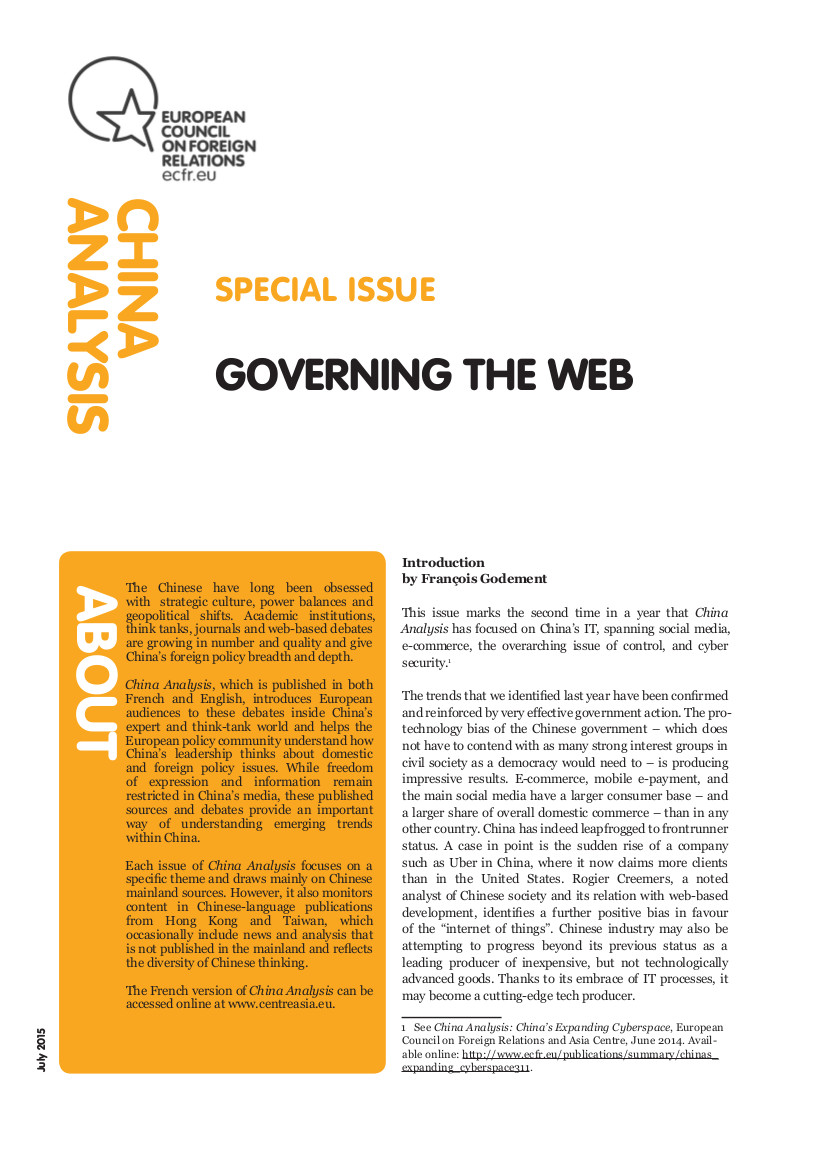Governing the Web
China is racing ahead with its internet revolution, with potentially huge ramifications for China’s surveillance state
China is racing ahead with its internet revolution, with potentially huge ramifications for China’s surveillance state, according to this special edition of ECFR’s China Analysis.
“Governing the Web” examines Beijing’s growing interest in digital technology and notes a distinct change from seeing the internet primarily as a platform for communication, towards the implementation of newer concepts including Web 2.0 technology, the “internet of things”, mobile and wearable gadgets, and ubiquitous connectivity.
This change in direction has been welcomed by Chinese business leaders including Tencent CEO Pony Ma and Alibaba CEO Ma Yun, and expansion in digital access and technology is a key component of China’s future economic plans. The internet is estimated to contribute up to 22 per cent of China’s GDP growth up to 2025, an overall addition of 10 trillion yuan to China’s GDP, equivalent to the current GDP of Australia.
Director of ECFR’s Asia & China programme François Godement identifies an authoritarian tendency in this growing state involvement in the digital realm. He points out existing requirements for the entire internet chain, from servers, software support to originate in China as a part of this. But the new direction towards e-commerce and the ‘internet of things’ augurs complete party-state oversight of social and individual life.
Rogier Creemers, said
“The internet has gained a new importance in Chinese domestic politics. It is seen as a powerful driver of economic reform, enables more effective social management by government, and realigns the central-local nexus within the party-state architecture.
“Nevertheless, there are international tensions, particularly in the relationship with the United States. Concerns about information and network security have driven China to pursue a policy of software indigenisation and to raise the requirements for foreign technology suppliers. They also fuel the hawkish voices that are already prominent in Chinese public discourse.
“If China and the international community wish to continue reaping the benefits of burgeoning technological change, it will be necessary to achieve some level of mutual co-operation that addresses China’s security concerns while maintaining the operational openness and ethos of collaboration at the heart of the internet’s architecture.”
François Godement, Director of ECFR’s Asia & China programme, said:
“The pro-technology bias of the Chinese government – which does not have to contend with as many strong interest groups in civil society as a democracy would need to – is producing impressive results. E-commerce, mobile e-payment, and the main social media have a larger consumer base – and a larger share of overall domestic commerce – than in any other country. China has indeed leapfrogged to frontrunner status.
“There is, however, a flip side to this achievement. The Chinese government’s attempt to regain control of the entire internet chain has been well documented. China has, in the space of one year, considerably strengthened its stranglehold on web surfing in China, as any visitor will quickly discover.
“This issue, however, points to an even more worrying development. The spread of e-commerce and online payment means that new methods of checking consumer credit and sellers’ track records are necessary. They have become part of our online lives, along with the cookies that allow marketing firms and banks to track our consumer and financial behaviour. But in China, this is opening the way to a programme of control on all aspects of social and individual life, including political and professional oversight.”
The European Council on Foreign Relations does not take collective positions. ECFR publications only represent the views of their individual authors.



